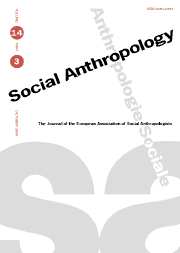No CrossRef data available.
The predicament of writing the history of anthropology
Published online by Cambridge University Press: 07 October 2004
Extract
Thomas Hylland Eriksen and Finn Sivert Nielsen. 2001. A history of anthropology. London and Sterling, Virginia: Pluto Press. 207 pp. Hb.: £45.00/$69.95. ISBN: 0 7453 1390 6. Pb.: £14.99/$22.50. ISBN: 0 7453 1385 X.
Alan Barnard. 2000. History and theory in anthropology. Cambridge: Cambridge University Press. 243 pp. Hb.: £45.00. ISBN: 0 521 77333 4; Pb.: £16.95, ISBN: 0 521 77432 2.
R. Jon McGee and Richard L. Warms. 2000. Anthropological theory. An introductory history (second edition). Mountain View, California: Mayfield Publishing. 599 pp. $67.75, ISBN: 0 7674 1166 8.
Thomas C. Patterson. 2001. A social history of anthropology in the United States. Oxford and New York: Berg. 212 pp. Hb.: £45.00. ISBN: 1 85973 489 8. Pb.: £14.99 ISBN: 1 85973 494 4.
If it makes sense to speak of postmodernism in social and cultural anthropology, Writing culture (Clifford and Marcus 1986) is undoubtedly one of its key texts. To judge from recent introductory texts on the history of anthropology it has become part of the identity of anthropology that this is indeed the case, for better or for worse (Barnard 2000: 169; Eriksen and Nielsen 2001: 147; McGee and Warms 2000: 564; Patterson 2001: 153). This also means that authors of such historical accounts become caught in what might be called ‘the predicament of history’. From a postmodern point of view any continuity through time of a discipline like anthropology is contingent and depends on changing external conditions. Nineteenth-century evolutionary anthropology may have nothing more in common with twenty-first century reflexive anthropology (or any other variety) than its name, and even that may be debatable. Yet if this is so, we should be able to point out the differences between such anthropologies and account for them. The only way to do so is to consider the history of anthropology. Even if we believe history to be only a figment of our imagination, we cannot do without it, least of all if we want to understand phenomena like postmodernism.
- Type
- Review Article
- Information
- Copyright
- © Cambridge University Press 2004




